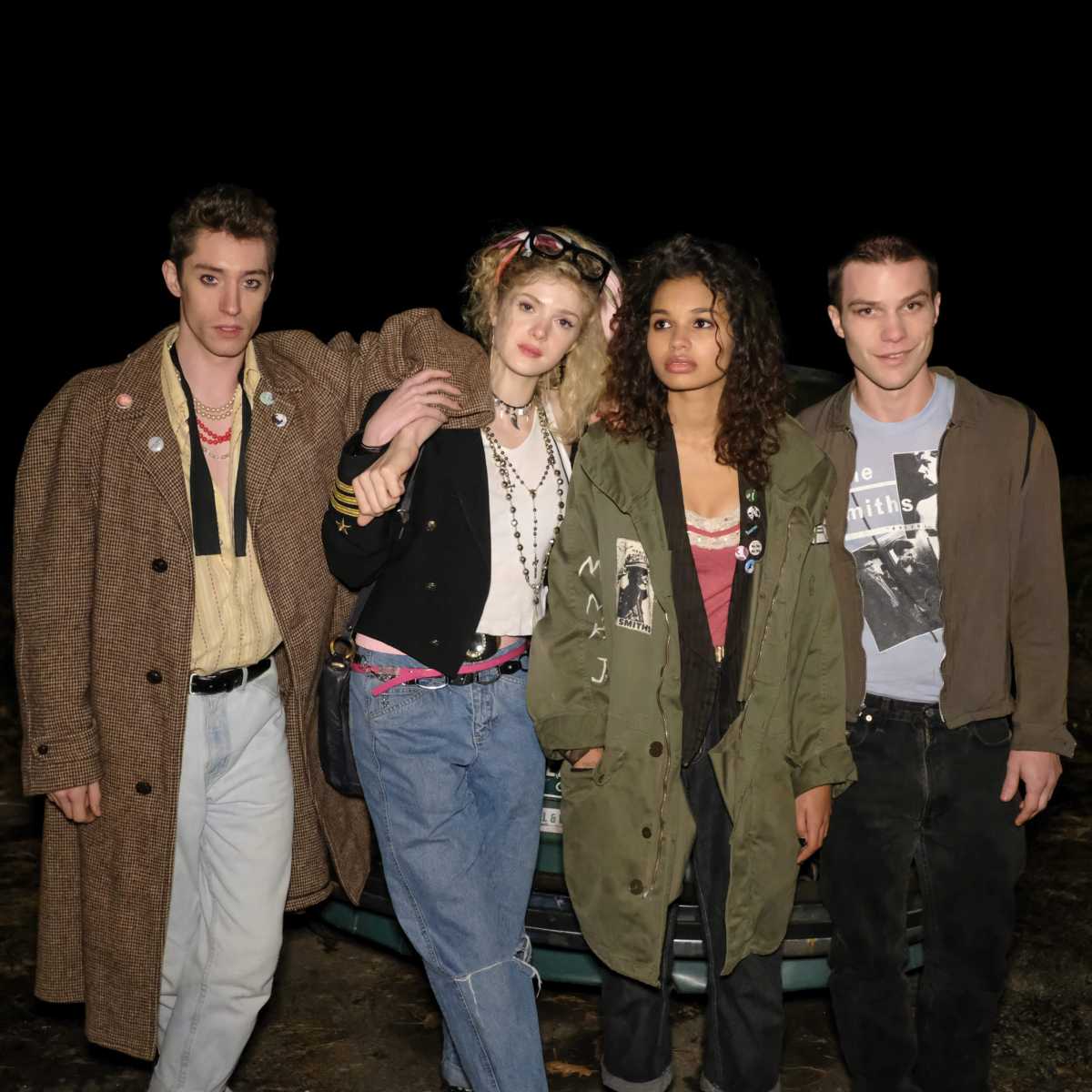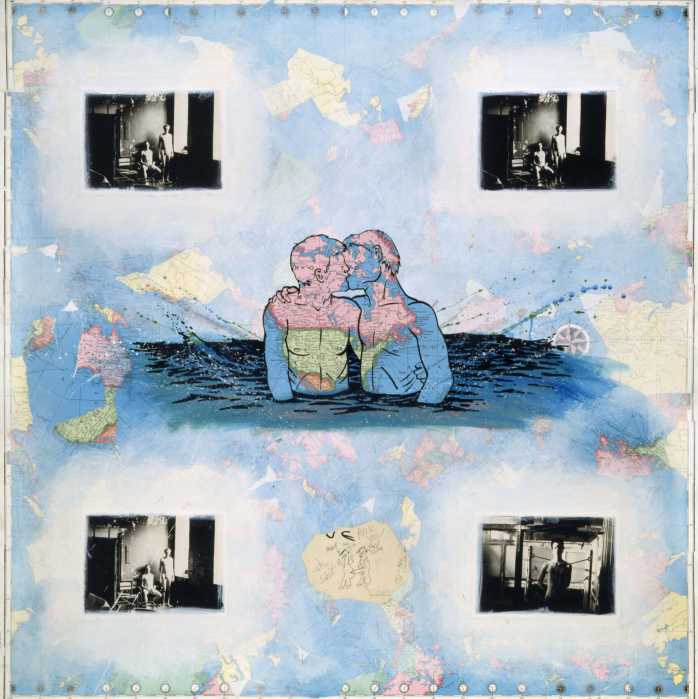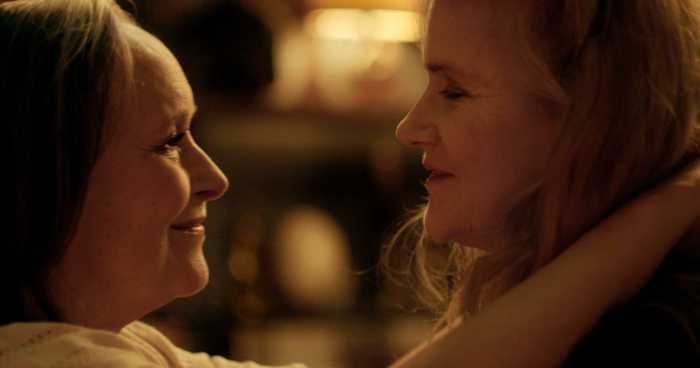Out gay writer/director Stephen Kijak’s “Shoplifters of the World” is an ode to The Smiths, a band that in 1987 — when the film is set — was for some fans, the greatest band in the world. This uneven comedy-drama shows how five teens smitten with The Smiths process the band’s breakup over one night. (Any similarity to “American Graffiti” is probably overt).
Cleo (Helena Howard) is a Denver checkout clerk at a supermarket who drives a Volkswagen Bug with a license plate that reads, “MEATISMRDR,” after a Smiths album, and shoplifts cassettes from the music store, where Dean (Ellar Coltrane) works. Cleo is devastated when she hears the news that the band is calling it quits. She picks up her friend Billy (Nick Krause), who is heading off to join the Army the next day, as well as Sheila (Elena Kampouris) and her boyfriend, Patrick (James Bloor), who may or may not be gay. The four friends are depressed by The Smiths’ breakup and spend what may be their last night together celebrating and mourning. Meanwhile, Dean takes a gun and goes to the local radio station to force DJ Full Metal Mickey (Joe Manganiello) to play Smiths songs all night long.
“Shoplifters of the World” uses the band and its music to comment on the characters. The film is best when it emphasizes how a song, a performer, or even a musician’s style can influence youth culture and make teens (as well as adults) not feel so alone. Watching Patrick and Billy wear eyeliner, or Sheila dressing as a “tomboy Madonna,” make this point. Likewise, when Dean admits he does not eat meat, and Patrick insists on being celibate, both are taking cues from The Smiths’ frontman, Morrissey. But when Cleo states, “a strange fear gripped me” — a lyric from The Smiths’ song, “There Is A Light That Never Goes Out” — having the tune plays on the soundtrack at the same time feels forced.
Kijak provides context by including clips and interviews from the band. The filmmaker also replicates scenes from The Smiths’ videos for “Stop Me If You Think You’ve Heard This One Before” by having a group of cyclists riding around the characters in the streets. It is a cute moment — perhaps.
The film has unbridled affection for the band with a focus on their music. (There are also Smiths posters and references in almost every scene). But “Shoplifters of the World” fails to articulate why these particular teens are so infatuated with the band, which is a major drawback. When Dean debates music with Full Metal Mickey, their exchange explains how songs can be an escape or provide salvation. Dean, who contemplated suicide, talks about The Smiths’ music being “lifesaving,” but the disillusionment he and his angsty teen friend feel never quite resonates.
Considering that the characters talk about The Smiths as “the only band that matters,” it would be nice to see why that is the case. Instead, “Shoplifters of the World” features Dean moping about being secretly in love with Cleo, who is depressed about her life. But Coltrane’s flat unaffected performance never conveys his character’s despair. He is more bland than sullen, and Helena Howard’s Cleo should be more rebellious or unconventional. Hearing her sounding off on why she hates Molly Ringwald and her “Pretty in Pink” character reveals more about her than anything she says that is Smiths-related.
In contrast, the storyline involving Sheila wanting to have sex, and Patrick, who is afraid of his attraction to men, lumbers towards the obvious. Thankfully, Billy’s character injects the film with some verve — and not just because he is first seen masturbating by rubbing pink balloons on his naked crotch. His character’s musings about identity are interesting. Nick Krause is exceedingly fun to watch; he is the one character viewers might actually want to spend time with. When Billy explains to someone that he kissed Patrick in order to show Patrick who he can be — and because Billy doesn’t know who he is — it is genuinely touching. The film could have used more warm moments like this one. Instead it offers a character quoting Oscar Wilde’s line, “Be yourself, everyone else is taken,” to Patrick, which may induce eye-rolling. (And no disrespect to Wilde, but at least quote The Smiths!)
Late in the film, during a scene at a gay bar (where Bronski Beat is heard), the bouncer asks Sheila why she’s mopey. When she responds that The Smiths broke up, the bouncer retorts, “Is that all?”
“Shoplifters of the World” may, unfortunately, generate that same reaction from viewers. Surely, hardcore Smith fans will be underwhelmed by this drama, and non-fans may wonder what the fuss is about. However, the film does show Mickey the metalhead opening his mind about the band’s music and appreciating their sound and their message. Perhaps a passing interest is all that Kijak’s patchy film can accomplish.
To sign up for the Gay City News email newsletter, visit gaycitynews.com/newsletter.



































